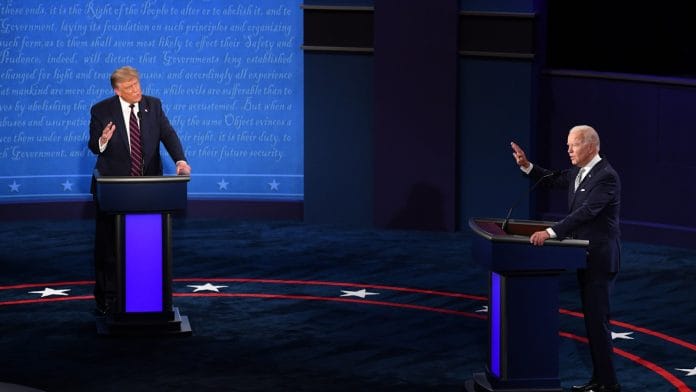Globally, political systems were in a state of ‘new normal’, long before Covid-19 forced us to rethink many aspects of our lives. The past decade has propelled rising protectionism, global disintegration, tough stances by elected leaders on minority and immigration-related issues and a dormant cold war among trading partner countries triggered by US President Donald Trump.
The 2020 US Presidential elections are bound to be a landmark event for the world order. For India, the future discourse of the US-India relations will be starkly different depending on who takes charge of the White House.
Critics may argue that there’s a (rare) consensus in Washington regarding policy on US-India relations. However, the devil lies in the details.
Pakistan and the Kashmir issue
The US has shed its pro-Pakistan image in the last four years, courtesy Trump, and his administration’s hard stance on Pakistan would continue if he returns to power.
The Biden administration may adopt a softer approach but it is not likely to consider Pakistan an important foreign partner, primarily, because Islamabad lost its bargaining power after the US troops withdrew from Afghanistan. Additionally, Pakistan’s proximity to China also poses a problem since both Trump and Biden have an identical stance against the latter.
The Kashmir issue presents a unique challenge to both the candidates.
While Trump offered to mediate and receded silently when India didn’t accept the offer, essentially keeping an arm’s length, Biden’s strong views against human rights violations and repeated condemnations of India’s handling of Kashmir issue may prove to be a deterrent in future negotiations.
India as a counterweight to China
China’s growing dominance in business, industry and political influence has challenged long-existing geopolitical boundaries, and US hopes to restore balance by using India as a counterweight. However, while the Trump administration is likely to adopt an individualistic approach, trying to fight trade wars with China unilaterally, the Biden administration would take a diplomatic route by bringing concerned stakeholders to the discussion table and contemplating an amenable compromise, multilaterally.
With that perspective, Biden’s presidency could be a win for India, as India’s political and strategic interests can then find a way through peaceful, multi-stakeholder, dialogue-focused diplomacy that the Democrat candidate champions.
Global strategic cooperation vs regional protectionism
In the last four years, bilateral trade wars have escalated with a vicious cycle of tariff imposition and retaliation. Given Trump’s economic development promise, it’s unlikely there would be any deviation from his pattern of policymaking. In fact, trade wars and its ill-effects would become much more evident if he reigns in the November elections.
In contrast, Biden as President offers hope of a more decisive global and regional strategic cooperation on most matters concerning economic and welfare policies, given the ‘Democrat’ way of moderating world affairs.
Naturally though, these won’t be without resistance from member stakeholders, which may delay execution, sometimes indefinitely.
India’s internal affairs
Since both administrations’ ideologies align broadly, the Trump administration hasn’t particularly engaged with its Indian counterpart in dialogues over India’s internal affairs.
This was highlighted during the highly contentious anti-CAA protests, which found no mention in his speech in Ahmedabad.
The US approach will change if Biden takes charge, given his history of criticising Modi government’s handling of Kashmir issue and expressing displeasure with policies that defy what he calls “India’s long tradition of secularism”.
The Modi administration will not like such meddling with its internal affairs and hence future negotiations and discussions risk being stalled because neither party may be willing to budge.
Climate change and Iran nuclear deal
Trump pulled the US out of both the Paris Agreement and the Iran Nuclear deal, and Biden’s presidency shows early promise of reversing both those decisions.
With the Iran nuclear deal back in place, India would get access to cheaper oil and with the US re-joining the Paris Agreement, climate change negotiations would become commonplace where India’s interests and leadership position in combatting climate change (take ISA for example) should be duly considered.
However, given China’s pole position in these discussions, US would have to downplay its anti-China sentiment which wouldn’t go down well with the Indian leadership.
It feels like India-US relations have reached an inflection point, and who takes charge of the White House would dictate the terms of India’s US-focused policymaking. Trump’s political philosophy and economic development, coupled with protectionism and ‘restoring social justice’ narrative perfectly complements Modi’s objectives, and so intuitively he appears to be a good fit.
However, over the longer term, Biden’s multi-party, dialogue-oriented diplomacy, inclusive growth and strategic global development worldview approach should serve India’s interests better, given our strategically and geographically important position, which can be leveraged in negotiations. How policy paralysis risks will be mitigated remains to be seen.
Shubhankar Mishra is a student of Indian Institute of Management, Indore






